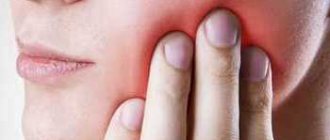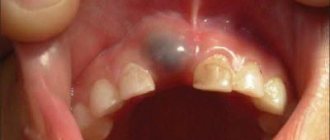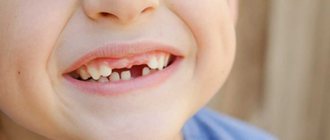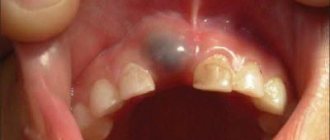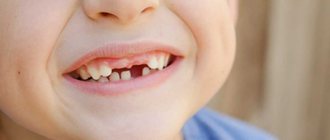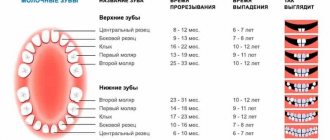In children from the age of 5, temporary milk teeth begin to fall out and are gradually replaced by permanent ones, which will serve for the rest of their lives. Many parents are interested in the question: how many teeth change in childhood? All baby teeth fall in, and permanent teeth grow in their place. They change in the same order as during teething. But parents should know that at the age of 6-7, the baby begins to grow his first permanent molars (sixth teeth) - they are the ones that remain for life. Children's fifth molars are the last to fall out and are replaced with permanent molars. Teeth are completely replaced by about 12-14 years, but it all depends on the individual characteristics of the body and various other factors.
Often, during tooth replacement, some non-standard situations and features can be observed, because of which parents begin to worry. Let's take a brief look at the most common questions:
What reactions of a child’s body are possible during the period of loss of baby teeth and growth of permanent teeth?
Replacing teeth is almost painless. The loss of baby teeth occurs on their own after their root is completely absorbed or removed at home, and if the permanent tooth is already growing, but the permanent one has not yet fallen out, the help of a pediatric dentist is required. When permanent teeth erupt, pain usually does not occur. Very rarely, there may be a slight increase in body temperature, itching of the gums or discomfort in the abdomen. In this case, the child does not need treatment, but it is recommended to visit a dentist.
Who to turn to for help
If your child has lost a baby tooth and a new one is not growing, he may have a metabolic disorder. It is best to contact your pediatrician to prescribe the appropriate examinations and tests. Further, long-term hospital therapy will be required if we are talking about a complex case. If necessary, the doctor will write out a referral to an orthodontist. This specialist will install dental plates and also explain why the baby tooth has fallen out and the permanent tooth has not grown in for a certain time.
Why can a lot of time pass between the loss of baby teeth and the eruption of permanent teeth?
Most often, the front teeth grow quickly. And canines and baby molars (premolars) can be delayed. After a temporary tooth falls out, it may even take 4-6 months until a permanent tooth erupts in that place. Just expect it and take good oral care. But if this period begins to exceed six months, so as not to worry, it is better to visit a doctor. After examining the child, he will be able to decide whether the permanent tooth needs to be stimulated to grow.
What can be done to improve the situation
If you find that your child has lost a baby tooth and a new one is not growing, you can influence the process of tooth development. Firstly, care must be taken to ensure that an infectious disease does not develop. Secondly, it is necessary to develop the child’s diet in such a way that he has enough vitamins and calcium. If there is an injury to the oral cavity, you must contact a medical facility. It is necessary to promptly restore the functionality of the gums even before the development of molars. If we are talking about a complex case, then radical treatment methods will be required.
Only a dentist can determine at what stage of development a particular molar is. Remember that the front baby teeth of the lower row must fall out first.
If the cause of the pathology is an infectious disease, it is necessary to restore the child’s immune system. It is also advisable for the baby not to worry and avoid stress.
Which teeth should an eight-year-old child have?
Every child who has reached the age of eight should normally have the following permanent teeth - 4 lower and 4 upper incisors, sixth molars. Sometimes there may be individual deviations in teething within plus or minus six months.
Why is it necessary to treat caries in childhood if you then have to remove baby teeth with filled roots?
If an empty space forms in the dentition, this contributes to the fact that the remaining milk teeth shift, and along with them, the rudiments of permanent teeth also shift and they begin to grow incorrectly under them - in one place the formation of cracks begins, and in another - the teeth fit alone another. A filled, treated baby tooth will save space for a permanent tooth. Untreated teeth infect the rudiments of permanent teeth with infection, which causes their deformation and even complete absence.
Physiological causes of pathology
The primary dentition is not immediately replaced by primary teeth. After a baby tooth falls out, a certain period of time must pass. Only after this does the molar appear. Subsequently, he completely takes the place of his predecessor. But some children, even 3 weeks after the loss, do not even have a hint of teething. Parents are starting to worry. However, this does not always indicate the presence of the disease. There are cases when the dental body began to erupt only after 1 or 2 months. There could be many reasons for this. In addition, there are cases that even adults retain their baby teeth. Only a specialist can determine this.
One of the reasons why a baby tooth falls out and a new one does not grow is the absence of its rudiments. Pathology can be diagnosed using an x-ray. In this case, the patient is given dental plates, and upon reaching adulthood, a new dental body is implanted. There is no other way to solve the problem.
But there are teeth, the formation of which occurs quite late. These are eights. Their rudiments are formed only in adolescence - at 13 or 14 years old.
Parents should remember that they should go to the hospital in a timely manner in all cases if any pathology is noticed in the child’s oral cavity. If more than three months have passed since the tooth loss, and there is also redness and swelling of the gums, then you cannot do without the help of a doctor. Such symptoms indicate that the dental body cannot erupt. In this case, the edge of the gums may acquire a blackish tint. In this case, the specialist must open the gum so that the new tooth can emerge.
When considering the question of why the baby fang fell out and the molar (or other teeth) does not grow, it is necessary to establish the causes of the pathology. They are as follows:
- Infections that affected the formation of dentition rudiments.
- Serious mechanical injuries.
- Incorrect dental treatment.
- Lack of calcium in the body.
- Unbalanced child's diet.
- The presence of caries, which slows down the development of the permanent tooth.
Why can a 7-14 year old child sometimes experience pain when all his teeth are intact?
Yes, this can happen, but in this case the pain occurs not in the tooth itself, but in the jaw, which is growing rapidly at this age. Since permanent teeth are almost twice as large as baby teeth, they need much more space. Therefore, large new teeth can sometimes overlap each other or grow at an angle, getting out of the dentition. As the jaw grows, they align and settle into place. But a qualified specialist can competently assess this situation, as well as the risk of anomalies and developmental defects. That is why in this case you will need to consult an orthodontist.
Other causes of deviations
Worried about why a baby tooth has fallen out and a new one is not growing, many parents think about physical pathologies. They do not realize that there are some other reasons that contribute to the disruption of the development of permanent dentition. Negative factors include:
- Poor environmental conditions.
- Eating foods that are harmful to the body.
- Frequent stressful situations.
- Eating cereals and purees too often.
At what age should a bite be corrected?
You can start correcting your bite at 4-5 years of age. In this case, the growth of permanent teeth will be even, in the place intended by nature. Therefore, there is no need to carry out subsequent long-term bite correction. In any case, if there is a malocclusion, the problem can be eliminated efficiently and as quickly as possible by contacting a qualified orthodontist as early as possible.
| Teeth | Dairy (temporary) | Permanent | ||
| Jaw | Lower | Upper | Lower | Upper |
| Central incisors | 6-12 months | 8-12 months | 6-7 years | 6-8 years |
| Lateral incisors | 10-16 months | 9-13 months | 7-8 years | 7-8 years |
| Fangs | 17-23 months | 16-22 months | 9-10 years | 11-12 years old |
| First Premolars | — | — | 10-12 years | 10-11 years |
| Second Premolars | — | — | 11-12 years old | 10-12 years |
| First Molars | 14-18 months | 13-19 months | 6-7 years | 6-7 years |
| Second Molars | 23-33 months | 25-33 months | 11-12 years old | 11-13 years old |
Timing of eruption of molars
Before you figure out why baby teeth fall out and new ones don’t grow, you need to find out the timing and norms for the growth of molars, established by dentists. This will allow you not to panic ahead of time and consult a doctor in time if necessary.
The rudiments of baby teeth begin to form in the first trimester of pregnancy (at 8 weeks), and at 20 weeks the rudiments of molar teeth are formed. They are located very deep in the baby's jaw. It should be understood that not all teeth that erupt in a little person will fall out in the future. Some of them become permanent immediately.
The baby's first tooth appears at approximately 6 months. By the age of three, all his teeth have grown. When do the molars erupt?
By about 7 years of age, the baby grows molars, which in dental practice are called sixth teeth. At the age of 11 to 13 years, molars also appear, but this time the 7th ones. These teeth do not have milk analogues; after eruption, they immediately become permanent. All other molars gradually replace baby teeth. At the age of 6 to 8 years, the child’s central incisors sprout, and from 7 to 9 years, the lateral incisors erupt. From 10 to 12 years of age, the child begins to grow premolars, which are also called fifth and fourth teeth, according to the dental formula. Molar canines erupt between the ages of 9 and 13 years. Adults develop wisdom teeth, but not always. Considering that the process of changing teeth takes place according to a certain schedule, parents are concerned about why their child is experiencing some kind of delay. Usually they are very worried about why the baby teeth have fallen out, but the permanent teeth are not growing.
How to avoid problems
To avoid problems associated with delayed growth of molars,
Expectant mothers must adhere to some rules:
- Avoid bad habits, since smoking and drinking alcohol can negatively affect the development of tooth buds.
- Carefully monitor your oral hygiene and visit your dentist promptly.
- Take care of your health, do not contact sick people during pregnancy.
- Try to strengthen your immune system in every possible way.
- Avoid eating unhealthy foods.
- Do not self-medicate.
- Do not take antibacterial drugs under any circumstances without a doctor's prescription.
After the baby is born, remember these recommendations:
- Oral hygiene should be performed from the moment the first baby tooth appears.
- If caries is detected, do not forget about timely treatment. Baby teeth are highly susceptible to carious lesions.
- Protect your baby from injury.
- Remember that the child must eat properly and receive all the vitamins and minerals necessary for growth from food.
- Limit your intake of sweets.
- Make sure that sucking a pacifier or thumb does not become a bad habit. This may affect the development of the bite.
- After eating, the baby's mouth should be rinsed.
- Choose a suitable toothbrush and toothpaste for your child.
- Be sure to include solid foods in your diet, this will help ensure proper load on the jaw.
If you notice that a child’s molar does not appear for a long time, this is not a cause for concern. It would be a good idea to visit a pediatric dentist. Don't forget that all babies are individual, so the timing of the eruption of molars is different for everyone.
Why is the order of changing teeth important?
First, the incisors, and only then the molars and canines - this order determines the normal course of jaw development and the formation of a correct bite. If teeth fall out in the wrong order, this can lead to malocclusion and subsequent problems.
Malocclusion is not only an aesthetic problem that changes facial features, but a physiological one. As a result, pronunciation and clarity of speech are impaired, the quality of chewing food deteriorates, which can lead to disruptions in the functioning of the gastrointestinal tract.
Several reasons can cause a disorder in the order of tooth loss:
- trauma - the baby hit himself and knocked out or damaged a tooth, causing it to fall out prematurely;
- diseases of the oral cavity - enamel hypoplasia, caries or pulpitis.
It happens that parents “neglect” the condition of the child’s oral cavity, believing that there is no need to care for or treat baby teeth. They'll fall out soon anyway. This leads to negative consequences.
Firstly, the baby does not develop a culture of oral care. And at an older age, he will not closely monitor the health of his molars, which will cause the active development of carious processes and their early loss.
Secondly, caries of baby teeth is not a harmless disease. It destroys teeth, causing them to fall out earlier, spreads aggressively in the mouth and can infect the molars and molars, which are located in the gums. Caries in children must be treated. And the sooner parents notice white or dark spots on the enamel and the sooner they consult a doctor, the greater the chance that the doctor will “catch” the disease at an early stage. And it will not have time to lead to dangerous consequences for the baby’s health.
If the order of changing teeth is disrupted as a result of injury or illness, you should consult a doctor. It is important to consult a pediatric dentist to help get rid of oral diseases. And also an orthodontist, who will recommend options for correcting the primary bite and select means that do not allow the teeth located next to the freed space to move arbitrarily.
pixabay.com/
